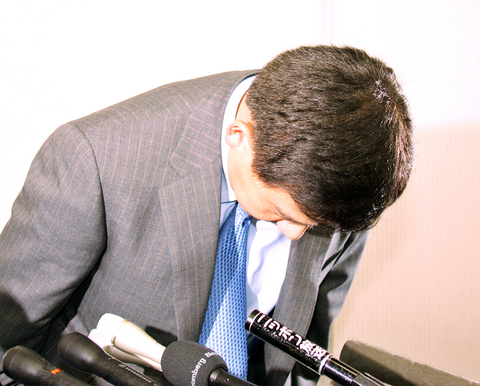A well-known Japanese fund manager acknowledged yesterday that he had engaged in insider trading in an unfolding case that is drawing intense attention in a nation where aggressive investment funds are still relatively rare.
"It's my fault, I broke the law," Yoshiaki Murakami, president of MAC Asset Management Pte fund widely known as Murakami Fund, said at a press conference yesterday in Tokyo that was broadcast nationwide. "I have signed an affidavit to that effect."
Murakami said that he may be charged with insider trading, forcing him to cede control of his US$3.6 billion investment fund.

PHOTO: AFP
Murakami rose to fame as an outspoken proponent of investor rights and free markets.
But he was widely viewed with suspicion by many among the old-guard business establishment as just being out for money and representing dubious foreign investors, and not interested in proper Japanese management practices.
Murakami denied that he intended to commit a crime when he bought a large number of Nippon Broadcasting System Inc shares with advance knowledge that Internet startup Livedoor Co would make a takeover bid for the radio network.
He said he chanced upon that information and was not fully aware that his actions may constitute insider trading.
Livedoor executives, including former president, Takafumi Horie, are embroiled in a separate criminal case, centered on falsifying is own earnings reports and those of a subsidiary. Horie was arrested earlier this year on charges of violating securities exchange regulations.
Japanese media reports said that Murakami could be arrested later yesterday.
Murakami, a 46-year-old former government bureaucrat, said he had signed a document with Tokyo prosecutors admitting wrongdoing, and he expected to be charged.
He also said he was stepping down as fund manager although his fund will continue to operate.
"I didn't intend to commit a crime," Murakami said. "I made a mistake."
The Murakami Fund bought a large stake in Nippon Broadcasting shortly before Livedoor and Fuji Television Network Inc launched a heated takeover battle for the radio broadcaster.
Livedoor had bought Nippon Broadcasting shares from other investors in off-hours trading last year, raising its stake to 35 percent from about 5.4 percent. The Murakami Fund is believed to have sold part of its stake to Livedoor, reaping hefty gains, media reports say.
The fund has recently been under media scrutiny for accumulating a 47 percent stake in major Japanese railroad company Hanshin Electric Railway Co.
Last week, a rival railroad, Hankyu Holdings Inc, offered to buy out Hanshin, apparently in reaction to fears that Hanshin will get taken over by Murakami. The ruckus over Hanshin illustrates Murakami's negative image among some in Japan's business community and the mainstream media.

CHIPMAKING INVESTMENT: J.W. Kuo told legislators that Department of Investment Review approval would be needed were Washington to seek a TSMC board seat Minister of Economic Affairs J.W. Kuo (郭智輝) yesterday said he received information about a possible US government investment in Taiwan Semiconductor Manufacturing Co (TSMC, 台積電) and an assessment of the possible effect on the firm requires further discussion. If the US were to invest in TSMC, the plan would need to be reviewed by the Department of Investment Review, Kuo told reporters ahead of a hearing of the legislature’s Economics Committee. Kuo’s remarks came after US Secretary of Commerce Howard Lutnick on Tuesday said that the US government is looking into the federal government taking equity stakes in computer chip manufacturers that

NORTHERN STRIKE: Taiwanese military personnel have been training ‘in strategic and tactical battle operations’ in Michigan, a former US diplomat said More than 500 Taiwanese troops participated in this year’s Northern Strike military exercise held at Lake Michigan by the US, a Pentagon-run news outlet reported yesterday. The Michigan National Guard-sponsored drill involved 7,500 military personnel from 36 nations and territories around the world, the Stars and Stripes said. This year’s edition of Northern Strike, which concluded on Sunday, simulated a war in the Indo-Pacific region in a departure from its traditional European focus, it said. The change indicated a greater shift in the US armed forces’ attention to a potential conflict in Asia, it added. Citing a briefing by a Michigan National Guard senior

POWER PLANT POLL: The TPP said the number of ‘yes’ votes showed that the energy policy should be corrected, and the KMT said the result was a win for the people’s voice The government does not rule out advanced nuclear energy generation if it meets the government’s three prerequisites, President William Lai (賴清德) said last night after the number of votes in favor of restarting a nuclear power plant outnumbered the “no” votes in a referendum yesterday. The referendum failed to pass, despite getting more “yes” votes, as the Referendum Act (公民投票法) states that the vote would only pass if the votes in favor account for more than one-fourth of the total number of eligible voters and outnumber the opposing votes. Yesterday’s referendum question was: “Do you agree that the Ma-anshan Nuclear Power Plant

ENHANCED SECURITY: A Japanese report said that the MOU is about the sharing of information on foreign nationals entering Japan from Taiwan in the event of an emergency The Ministry of Foreign Affairs yesterday confirmed that Taiwan and Japan had signed an agreement to promote information exchanges and cooperation on border management, although it did not disclose more details on the pact. Ministry spokesman Hsiao Kuang-wei (蕭光偉) said the ministry is happy to see that the two nations continue to enhance cooperation on immigration control, in particular because Taiwan and Japan “share a deep friendship and frequent people-to-people exchanges.” “Last year, more than 7.32 million visits were made between the two countries, making it even more crucial for both sides to work closer on immigration and border control,” he said. Hsiao